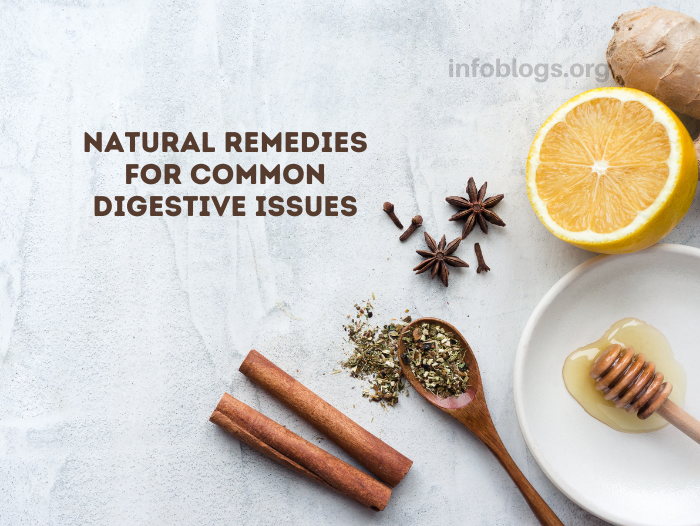Daily life can be disturbed and overall well-being can be affected by digestive problems. It is crucial to consult a medical professional for correct diagnosis and treatment, but there are also natural remedies that can alleviate common digestive issues. This article delves into some efficient natural remedies for common digestive issues, assisting in the restoration of balance to your digestive system and enhancement of gastrointestinal health.
Ginger for Upset Stomach:
For centuries, ginger has been utilized to alleviate nausea, bloating, and indigestion. Gingerol and shogaol are natural compounds found in ginger that have anti-inflammatory and soothing properties. These properties can help to calm an upset stomach. To ease digestive discomfort, you can sip on ginger tea, chew on crystallized ginger, or add freshly grated ginger to your meals.
Peppermint for Irritable Bowel Syndrome (IBS):
For a long time, peppermint has been utilized to ease the symptoms related to irritable bowel syndrome (IBS) like bloating, gas, and abdominal pain. Menthol present in peppermint oil can assist in relaxing the muscles found in the gastrointestinal tract. To alleviate IBS symptoms, consume peppermint tea or take enteric-coated peppermint oil capsules according to the given directions.
Chamomile for Acid Reflux:
If you are suffering from acid reflux or heartburn, chamomile tea can be helpful due to its calming effects. Chamomile has anti-inflammatory properties that can reduce inflammation in the stomach lining and promote relaxation. To alleviate acid reflux symptoms, try drinking a cup of chamomile tea after meals or whenever you experience discomfort.
Probiotics for Digestive Health:
To maintain a healthy gut microbiome, it is recommended to consume probiotics – beneficial bacteria that aid in digestion, reduce bloating and gas, and restore bacterial balance. Probiotic-rich foods such as yogurt, kefir, sauerkraut, and kimchi can be included in your diet. Alternatively, a healthcare professional can recommend a high-quality probiotic supplement.
Fennel Seeds for Indigestion:
The carminative properties of fennel seeds can aid in alleviating gas, bloating, and indigestion. After a meal, consuming a teaspoon of fennel seeds by chewing can encourage improved digestion and alleviate discomfort. Additionally, fennel seed tea can be made by steeping crushed fennel seeds in hot water for 10-15 minutes.
Papaya for Digestive Enzymes:
The enzyme papain found in papaya assists in protein digestion. Inadequate production of digestive enzymes can be helped by consuming papaya or taking papaya enzyme supplements to enhance digestion. Incorporate fresh papaya into your diet as a snack or add it to smoothies for its digestive advantages.
Slippery Elm for Gastritis and Ulcers:
For many years, slippery elm has been utilized to treat gastrointestinal issues such as gastritis and ulcers. When mixed with water, it produces a calming gel that shields the stomach lining and lowers inflammation. To relieve symptoms and promote healing, consume slippery elm tea or supplements.
Aloe Vera for Digestive Inflammation:
The anti-inflammatory properties of aloe vera can be advantageous for digestive problems such as inflammatory bowel disease (IBD) and gastritis. The ingestion of aloe vera juice (derived from the inner gel) can relieve inflammation in the digestive tract. Nevertheless, it is crucial to consume only high-quality, pure aloe vera juice and seek advice from a healthcare expert before incorporating it into your routine.
Dandelion Root for Liver Health:
For a long time, dandelion root has been utilized to maintain liver health and encourage good digestion. By increasing bile production, it assists in the digestion of fats and enhances overall digestive activity. You can relish dandelion root tea or add dandelion greens to salads to acquire their digestive advantages.
Hydration and Fiber for Regularity:
To keep your bowel movements regular, it's crucial to stay hydrated and get enough fiber. You can achieve this by drinking water frequently and incorporating fiber-rich foods such as fruits, vegetables, whole grains, and legumes into your diet. A healthy gut is supported by fiber, which promotes good digestion and prevents constipation.
Conclusion:
It is possible to find relief and assistance for common digestive problems through the use of natural remedies. Nonetheless, it is essential to bear in mind that everyone's reaction may differ, and it is advisable to seek advice from a medical professional before attempting any new remedies, particularly if you have pre-existing medical conditions. By integrating these natural remedies into your daily routine, you can enhance your digestive health and enjoy a better overall quality of life.


